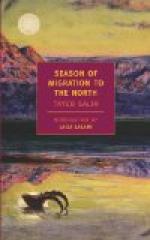Mackenzie made Chipewyan his headquarters for eight years. It was from here he started on his voyage to the Arctic Sea in 1789, and three years later on that other history-making journey to the far Pacific. Sir John Franklin outfitted here for his two land-journeys—in July, 1820, with Dr. Richardson, and again in 1825. Chipewyan is a mine of interest. We almost begrudge time given to the dainty meals of our hostess, Mrs. William Johnson, and the hours spent between her lavender-scented sheets.
In the loft above the office of the H.B. Company, in among old flintlock rifles and discarded ox-yokes, we browse through the daily records of The Company, old journals written by the Factors at the close of their day’s work through the years and here preserved for our inquisitive eyes. Sitting on the floor, making extracts from these tomes, one has the half-guilty feeling of being caught poking into a tomb.
On this page the ink is thin and one can see the old writer thawing out his frozen ink-pot of stone at the end of a tired day and sitting down to write his simple tale. Here are finger-marks where the blood of a buffalo gives a marginal note. The journalist had been called away from his writing to weigh and pay for some fresh meat. Drops from a tallow candle show the light of other days. A pressed mosquito of the vintage of 1790 is very suggestive. We picture the trivial round and common task of the man who writes, see him exchanging fathoms of tobacco for beaver-pelts in those long, cold winters, and eagerly hunger with him for the signs presaging the going-out of the ice and the coming-in of Spring. We follow out the short Summer with him and revel in its perpetual daylight. With him we make the fall fishery and shoot our winter’s supply of waveys and southward-flying cranes. We wonder, as he wondered, what news the next packet will bring from the old folks in the Orkneys or the Hebrides. We study, as he studied, the problem of governing his servants, placating the Indians, and making enough fur to satisfy that inexorable Board of Directors back in London whose motto is “Skin for skin.”
It has been a grim enough life as the author of this journal records it. He is far from those who direct his fate, and recognition and reward are slow in coming. Companionship and the gentle arts of “outside” are denied him. He must make his own world and rear within it his dusky brood, that they in honourable service may follow his round of “work done squarely and unwasted days.” What made the charm of this life to these men? It is hard to see. The master of the post was also master of the situation, and an autocrat in his community, a little Fur King, a Captain of Industry. A thing was law because he said it. And isn’t it Caesar himself who declares, “Better be first in a little Iberian village than second in Rome?”
We get a delightful picture in an entry under the date of Wednesday, 23rd May, 1827, when Sir John Franklin was on his way back to England at the end of his second journey.




